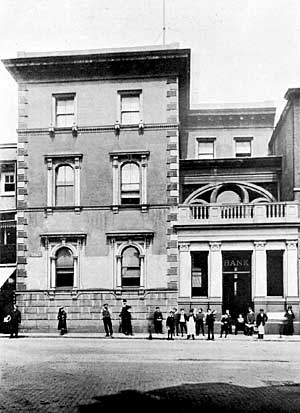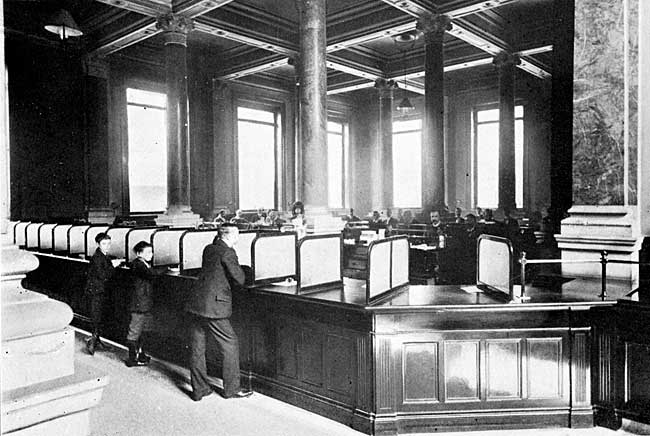< Previous | Contents | Next >
Messrs. J. & J. C. WRIGHT & CO.,
Bankers, Carlton Street, NOTTINGHAM.

Wright's Bank (Exterior).
AMONG the names most closely identified with the early progress of Nottingham's commercial importance, that of Messrs. Wright and Co., bankers, must be assigned a prominent place as representative of one of the oldest businesses in existence in the provinces, no less than in the continuity of succession in its proprietary through several generations of the founder's family. The history of the banking business may be said to date its origin from about the middle of the last century, although for many years previously the Wright family had been extensively engaged in the Baltic trade at premises in Long Row, where they were large importers dealing principally in iron, timber, and other commodities derived from abroad. Having at that time a widespread connection with Manchester, Stockport, Hull, Sheffield, and other of the principal trading and industrial centres of Lancashire, Yorkshire, and the Midlands generally, the firm were then in the habit of discounting the bills of merchants and manufacturers and supplying them with gold, and as this department of the business gradually assumed a greater importance the original trade was finally relinquished in 1761, and banking pure and simple was established in its place. The continuously progressive development of their business during the next thirty years compelled the acquisition of more commodious accommodation for its transaction, and in 1794 the firm leased from Mr. George de Ligue Gregory a considerable parcel of land fronting to George Street and Carlton Street (then known as Swine Green), together with the premises called "The Gregory Mansion," the old town house of the Gregory family, built about 1674, the property including a "paddock," reaching as far as Parliament Street to the north and Broad Lane (now Broad Street) to the east. In 1807, however, Messrs. Wright's purchased the freehold of the mansion and the adjoining property, and on this site the business has since been carried on.
Since that time, with the increased growth of the business, enlargements and improvements have been effected in the premises to meet the requirements of the firm's operations, and during the last forty years the bank buildings have on these occasions undergone extensive structural alterations, the most recent amounting almost to the entire re-building and remodelling of the establishment. This is opposite to the General Post Office and close to the Lace Market, and consists of a handsome and commodious edifice of substantial architectural style, and is furnished throughout with every modern convenience both for the customers and officials of the bank in each department.

Wright's Bank, Cashier's Department.
A brief retrospect of what may be termed the biographical history of the proprietary may appropriately be incorporated with this notice. In 1761, when the banking business was established, the head of the firm was Mr. Thomas Wright (father of the late Mr. Ichabod Wright of Mapperley Hall, who raised the first troop of the South Notts Yeomanry Cavalry), and at his death in 1790 he was succeeded by the last-named gentleman, who in conjunction with his cousin Mr. John Wright (then of Lenton Hall) became the principals. Five years later Mr. Ichabod Wright's younger brother, Mr. John Smith Wright (of Bulcote Lodge, and subsequently of Rempstone Hall) was taken into partnership, and the title was then altered to John Wright, Ichabod Wright, and John Smith Wright. Some few years later the last-named gentleman retired, and the firm assumed the style of John and Ichabod Wright and Co. In 1830, Mr. John Wright, the senior partner, retired, and became the principal founder of the "Butterley Company," now so widely known as the owners of some of the most extensive collieries and ironworks in Derbyshire and Nottinghamshire. His position was then taken by Mr. Ichabod Charles Wright, eldest son of Mr. Ichabod Wright, a distinguished classical scholar, well-known for his translations of Dante's Divine Comedy, the Iliad of Homer, etc., etc., who had previously joined the firm, whose title was again changed to Ichabod and Ichabod Charles Wright and Co., as it at present remains. Subsequently his eldest son, Colonel Charles Ichabod Wright, of Mapperley Hall, Nottingham, and Watcombe Park, Torquay, for many years in command of the "Robin Hood Rifles," and sometime representative of Nottingham in the House of Commons, became partner, and is now the head of the firm. In 1867 he was joined by his brothers, Mr. Henry Smith Wright, for many years member of Parliament for the Southern Division of Nottingham, and Mr. Frederick Wright, J.P., of Lenton Hall. In 1874 Colonel Wright's son, Mr. Charles B. Wright, joined the firm, and in 1878 Mr. H. Smith Wright retired, the only change in the proprietary since being the inclusion of Mr. J. W. Davy as partner in 1892.
